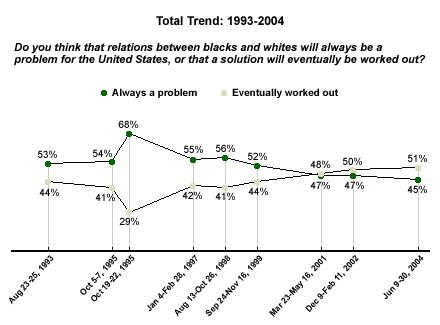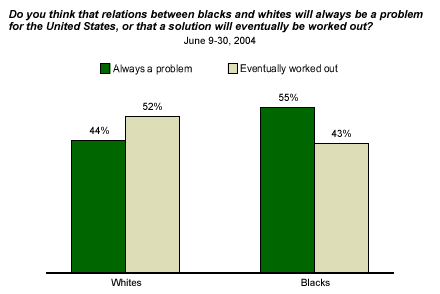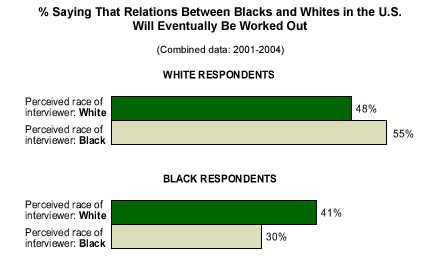For more than a decade, Gallup has been asking black Americans and white Americans a question that probes their expectations about the future of black-white relations in the United States. The question, asked most recently in a June poll on minority rights and relations*, is interesting for several reasons. Although phrased simply, it asks the respondent to choose between hope and despair on a defining issue in the historical, political, and social life of a nation that prides itself as a bastion of democracy.
Answering the question requires respondents to reveal personal views to a stranger -- a telephone interviewer -- on an issue that remains sensitive and divisive a half-century after the civil rights movement burst into the national consciousness. Partly as a consequence to this sensitivity, Americans' views on black-white relations are not frequently a conversation subject between strangers.
Public opinion on the issue is closely divided. Although the overall trend has not changed significantly for the last few years, this year the percentage of Americans offering a hopeful prognosis crossed the 50% threshold for the first time since Gallup began asking this question in 1993.

The survey results reveal a significant divergence of opinion between white Americans and black Americans, with black Americans tending to express a distinctly more pessimistic view of the future of black-white relations.

The gap between the opinions of white Americans and black Americans has been a familiar feature of this question over recent surveys; in surveys conducted between 2001 and 2004, black Americans have been an average of 15 percentage points more likely than white Americans to say that black-white relations will always be a problem.
A striking pattern in our survey results on this question lies hidden below the surface of these numbers. But first, some background information.
Race of Interviewer
Survey researchers studying racial opinions have known for decades that, for questions like this one that directly probe opinions about the state of race relations, respondents' answers can be affected not only by the race of the respondent and the life experience that she or he brings to the interview, but by the interviewer's race.
In this way, the question-and-answer process in surveys is much the same as everyday conversations. On controversial topics, particularly when the participants are not familiar with each other's views, people are sometimes reluctant to express opinions that might run contrary to those of the people they are speaking with. Whether a person answering a question "shades" his opinion might depend on a variety of factors including how strongly held and how extreme his opinion is, his feelings about the person asking the question, and his ability to anticipate the questioner's opinion (and thereby determine whether his own opinion would be judged negatively by the questioner).
Prior to the 1980s, when most national opinion surveys were conducted by face-to-face interviews, it was easy to understand how an interviewer's race, immediately visible to those being interviewed, could have a bearing on answers to racial opinion questions. The move toward telephone interviewing as the dominant mode of collecting national opinion data seemed to hold the promise of overcoming this potential source of distortion, but the promise was not realized. In part because those interviewed by telephone are surprisingly good at guessing an interviewer's race in the absence of visual cues, a select set of sensitive questions can be shown to be susceptible to race-of-interviewer effects even when surveys are conducted by phone.
In order to study whether our race survey data are susceptible to such effects, we took two steps. First, we worked to ensure that black interviewers conduct at least a quarter of the interviews. By doing so, we improved our ability to identify and reach reliable conclusions about race-of-interviewer effects. In addition, at the end of the interview, we ask respondents to guess the race of the interviewer who conducted the survey. In the present survey, more than two-thirds (68%) of those interviewed correctly identified the interviewer's race, a number close to what Gallup has found in prior race surveys. We examined whether answers to our "future of black-white relations" question were related to the perceived race of the interviewer for white and black respondents. In order to have large enough samples to interpret the results clearly, we combined Gallup data from surveys conducted between 2001 and 2004. The results are striking.

The findings reveal that at least some respondents "shade" their answers to this question, according to their perceptions of the interviewer's race. Both white and black respondents, when they believe they are speaking to an interviewer of a different race, give a more hopeful prognosis for black-white relations than they do when they believe they are giving their opinions to someone of their own race.
Bottom Line
Gallup's question on the future of black-white relations is unusual in its susceptibility to perceived race-of-interviewer effects: such effects are negligible or nonexistent for the large majority of our questions. But how do we interpret survey results like this? Although the data leave us a little less certain about how both groups really feel about the future of race relations, the results do not change the fact that black Americans -- regardless of the interviewer's race -- tend to be less hopeful than their white counterparts. And it is evident from the fact that interviewer race affects our results on this question, that racial sensitivity continues to influence the discussion of race relations in this country.
Respondents seem to be giving in to a conciliatory impulse -- a pattern remarked upon by earlier investigators of race-of-interviewer effects. Considering the possibility that a race-of-interviewer effect could run in the opposite direction (namely, that cross-race assessments could be more negative rather than more positive), this combination of being attuned to the sensitivity of black-white relations and acting in a conciliatory way might reasonably be taken as at least a mildly hopeful sign.
*Results are based on telephone interviews with 2,250 national adults, aged 18 and older, conducted June 9-30, 2004, including oversamples of blacks and Hispanics that are weighted to reflect their proportions in the general population. For results based on the total sample of national adults, one can say with 95% confidence that the maximum margin of sampling error is ±5 percentage points.
Results for the sample of 816 non-Hispanic whites, aged 18 and older, are based on telephone interviews conducted June 9-30, 2004. For results based on the total sample, one can say with 95% confidence that the margin of sampling error is ±6 percentage points.
Results for the sample of 801 blacks, aged 18 and older, are based on telephone interviews conducted June 9-30, 2004. For results based on the total sample, one can say with 95% confidence that the margin of sampling error is ±8 percentage points.
Results for the sample of 503 Hispanics, aged 18 and older, are based on telephone interviews, conducted June 9-30, 2004. For results based on the total sample, one can say with 95% confidence that the margin of sampling error is ±8 percentage points. (164 out of the 503 interviews with Hispanics were conducted in Spanish.)
